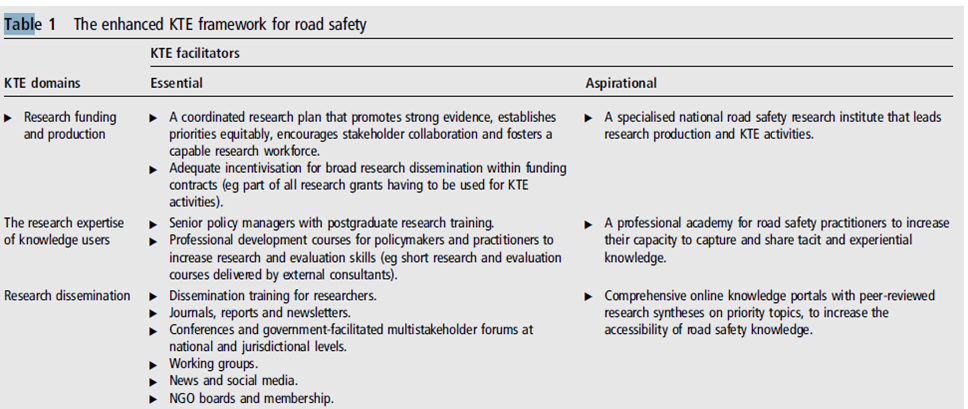No. 177: Knowledge Translation for evidence-informed road safety
Dr Adrian Davis
Top line: There are significant future road safety gains to be made by more effective use of Knowledge Translation & Exchange (KTE) through improved policy and practice.
The general aim of KTE is to promote effective and efficient policies, practices and research investments by reducing the gap between what we know and do. KTE has gained attention over recent years as part of the increasing global emphasis on evidence practice. KTE offers the road safety community a mechanism to address current and future challenges by facilitating collaborative learning and coordinated actions among diverse stakeholders to promote evidence-informed policies and practices.
A commonly referenced definition of KTE adapted for road safety as follows: KTE for road safety is a dynamic and iterative process that involves the co-production, synthesis, dissemination, exchange and ethically sound application of knowledge to improve the safety of road users.
However, with a small number of exceptions, KTE has been infrequently examined in the road safety literature and is largely neglected by transport policy agencies. Considering the millions of deaths and injuries caused by road trauma each year, KTE has a critical role for enabling effective policy and practice, and the impending transformation of the road safety field overcoming decade. A study aimed to generate a framework to enhance KTE in road safety and encourage evidence-informed policy and practice, identifying KTE facilitators.[1]
Potential impacts of facilitators in each KTE domain include at the organisational level increased prioritisation of KTE by research organisations, stronger research and evaluation cultures in policy and practitioner agencies and greater diffusion of research evidence with research, policy and practitioner organisations.
At the system level, we are likely to see increased co-production of research, as well as enhanced capture and mobilisation of practitioner knowledge to strengthen the road safety evidence-base, as well as increased transfer of research evidence to all stakeholders, including the public and better diffusion of knowledge throughout the road safety community through multi-stakeholder networks.
1 Hinchcliff, R. Senserrick, T., Travaglia, J. et al, 2017 The enhanced knowledge translation and exchange framework for road safety: a brief report on its development and potential impacts, Injury Prevention, 23: 114-1217.
No. 177: Knowledge Translation for evidence-informed road safety Download pdf PDF approximately 108.37 K